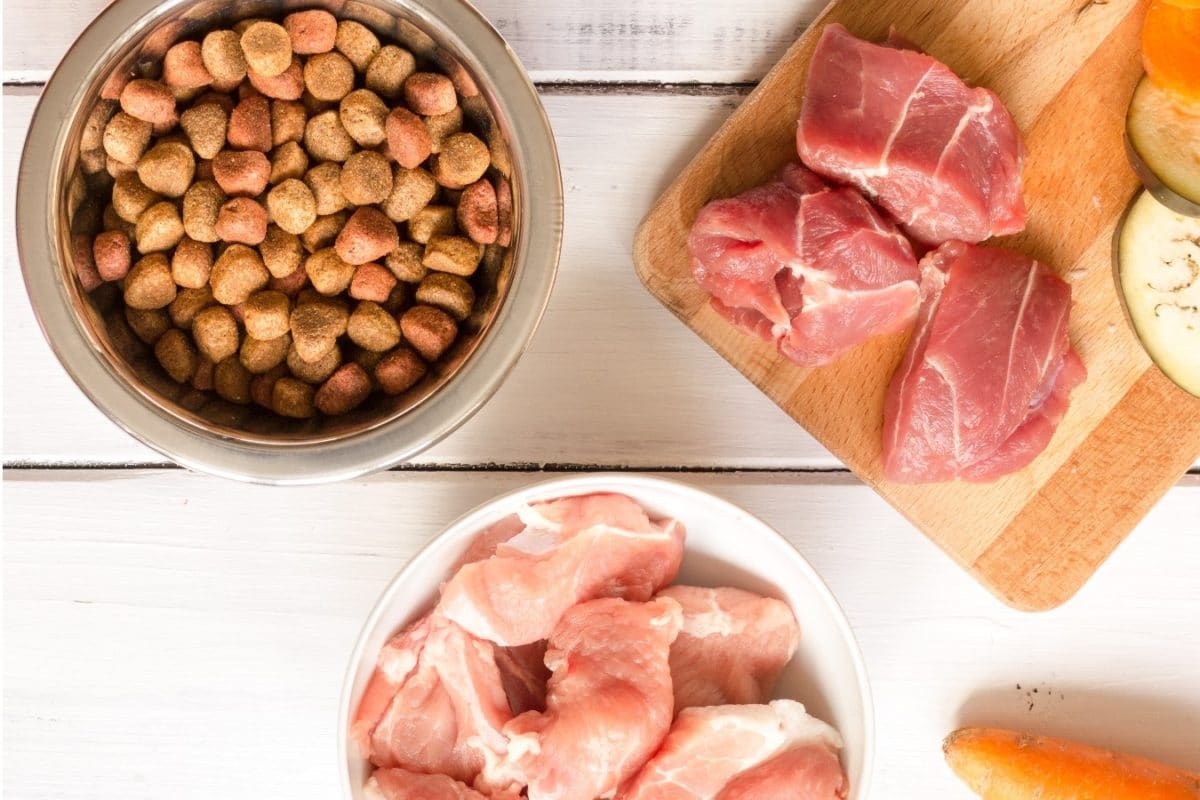Everything, Cats, Dogs
Is a Raw Food Diet Right for Your Cat or Dog?
For decades, we’ve fed our dogs and cats processed food from cans and bags. Pet food manufacturers and veterinarians have assured us that food made especially for cats and dogs is the best for their nutritional needs.
In recent years, the raw food movement for dogs and cats has spread across the continent. Is it a fad, or does a raw food diet have advantages for our pets?
Arguments for a raw food diet
The ancestors of our pet dogs and cats lived in the wild and ate raw meat. They didn’t get the degenerative diseases that our aging pets typically develop. Proponents of the raw food diet for cats and dogs tell us that our pets need raw food, that their systems haven’t evolved to eating processed food, and that processed food — or the absence of raw food — is the cause of these degenerative diseases.
Commercial dog food and cat food also contains cereals, which weren’t part of the natural diet of our pets’ ancestors.
Some studies back the claims that dogs and cats fed raw food have better health than those fed commercial dog or cat food. The study animals on a commercial diet developed the same types of degenerative diseases that people do, while those on a raw food diet didn’t.
Commercial pet food has had some of its nutrients destroyed by processing, raw food diet proponents say. It’s also less digestible because cooking kills the enzymes found in raw food. The animals’ immune systems are thus weakened, which leaves them more susceptible to disease.
Some animals in poor health thrive when switched to raw food. Their coats are shinier, they shed less, they have more energy, flea problems disappear, their teeth and gum health improve, and various other health conditions subside.
The raw food diet provides an additional option for animals with allergies. First, raw food doesn’t contain the additives that commercial food does. Second, animals are unlikely to be allergic to uncommon choices such as buffalo or ostrich meat (in addition to more common types of meat available).
The raw food diet can be more expensive than a commercial pet diet for cats and dogs. On the other hand, if the diet prevents health conditions that require ongoing veterinary treatment and medication, the raw food diet may save the pet owner money.
Arguments against a raw food diet
Some veterinarians believe that a typical raw food diet fed to dogs and cats has some nutritional deficiencies. They say that these deficiencies could affect animals after being on this diet for a long time. They may point out that while cats and dogs are resistant to salmonella and other bacteria, these infections (from raw meat) can be passed from animals to people.
With proper precautions, infections shouldn’t be a problem. However, some people, especially vegetarians, don’t like to handle meat. Raw food lacks the ease of serving that commercially prepared pet food provides.
Animals that we keep as pets are typically much less active than their wild ancestors, which had to hunt and kill their prey every day. The more sedentary lifestyle of pets requires a different diet.
Selective breeding (especially with dogs) has led to rapid changes in animals. Animals that are domesticated and bred to live with humans have adapted to eating cooked food, some say. And even the raw meat available is different from the raw meat that our pets’ ancestors ate — the meat of farm animals has a high fat content because of the diets they’re fed.
Manufacturers of commercial cat and dog food products have their own studies, and they keep finding ways to improve their products. Many pet foods contain a balance specifically formulated for animals with specific needs, based on their age, weight, health conditions, and other factors.
The choice for you
Your decision will probably be based on your pet’s health, the cost and availability of food options, convenience, and personal preference — yours and your pet’s. Some dogs and cats love the raw food diet, while others won’t touch it.
For those who want to learn more about raw food diets for cats and dogs, this DMOZ page of BARF diet links lists articles about the Bones And Raw Food diet. Some veterinarians and specialty pet food stores carry packaged raw food for dogs and cats.


